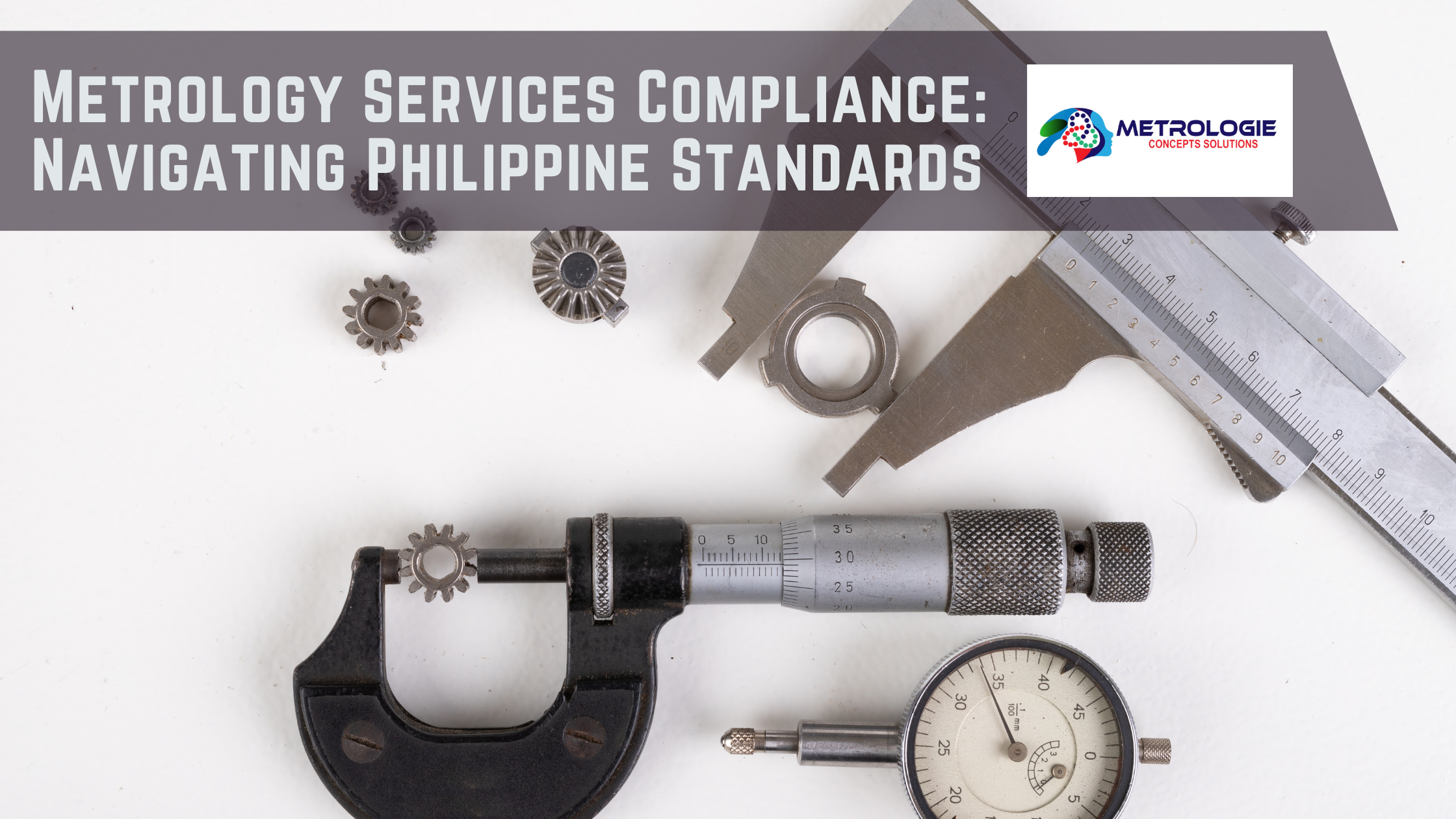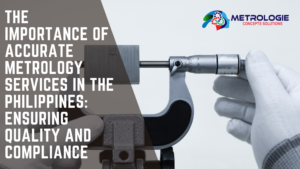In the fast-evolving landscape of industries, ensuring the quality and precision of products and services is paramount. Metrology, the science of measurement, plays a pivotal role in maintaining standards and compliance. In the Philippines, where industries are thriving and consumer expectations are rising, navigating through metrology standards is not just a choice but a necessity for businesses.
I. Introduction
Metrology services encompass a broad spectrum of activities related to measurement and calibration. From manufacturing to healthcare, adherence to stringent standards is crucial to guarantee accuracy and reliability in diverse applications. This article delves into the intricacies of metrology services compliance and explores the nuances of navigating Philippine standards.
II. Understanding Metrology in the Philippines
Definition and Significance
Metrology goes beyond mere measurements; it ensures that those measurements are accurate and consistent. In the Philippine context, the scope of metrology extends across various sectors, including manufacturing, healthcare, and trade. The precision demanded by these industries necessitates a thorough understanding of metrological principles.
The Role of Metrology in Various Industries
From the quality control processes in manufacturing to the precise measurements in medical laboratories, metrology is omnipresent. It serves as the bedrock for reliability and quality assurance, making it indispensable in ensuring that products and services meet or exceed customer expectations.
Regulatory Bodies Overseeing Metrology in the Philippines
To maintain a standardized approach to metrology, the Philippines relies on regulatory bodies such as the Philippine Accreditation Bureau (PAB) and the Department of Trade and Industry (DTI). These organizations set the guidelines and frameworks that businesses must adhere to, emphasizing the importance of compliance.
III. Importance of Compliance
Legal Implications of Non-Compliance
Non-compliance with metrology standards can have severe legal consequences for businesses. Fines, penalties, and even business closures are potential outcomes for those neglecting to meet the required standards. Understanding the legal implications is a fundamental aspect of fostering compliance culture within organizations.
Ensuring Consumer Safety through Compliance
Beyond legal ramifications, compliance with metrology standards is directly linked to consumer safety. Whether it’s the accuracy of medical equipment or the precision of consumer goods, adherence to standards ensures that end-users are not exposed to faulty or subpar products.
Boosting Industry Reputation and Credibility
Compliance is a badge of honor for businesses. It not only reflects a commitment to quality but also enhances a company’s reputation. Credibility is a valuable currency in the business world, and businesses that invest in compliance build trust with customers and partners alike.
IV. Philippine Standards in Metrology Services
Overview of Relevant Standards
The Philippines has adopted international standards, such as those set by the International Organization for Standardization (ISO), as a foundation for its metrology framework. Understanding and implementing these standards are critical steps for businesses looking to navigate the intricate landscape of metrology compliance.
Updates and Changes in Metrology Regulations
Metrology standards are not static; they evolve in response to advancements in technology and changes in industry needs. Staying informed about updates and changes in regulations is a proactive approach that businesses must take to ensure continuous compliance.
Compliance Requirements for Businesses
The journey toward compliance involves meeting specific requirements laid out by regulatory bodies. From precise calibration of equipment to maintaining accurate records, businesses must establish comprehensive systems to meet these requirements effectively.
V. Challenges in Navigating Metrology Standards
Complexities in Understanding and Implementing Standards
One of the primary challenges businesses face is the complexity of metrology standards. The technical nature of these standards can be daunting, requiring businesses to invest in training and education to ensure that personnel understand and implement them correctly.
Common Pitfalls in Compliance
In the pursuit of compliance, businesses may encounter common pitfalls, such as overlooking specific requirements or underestimating the resources needed. Identifying and addressing these pitfalls is crucial to maintaining a robust compliance strategy.
Overcoming Challenges in Adherence
Overcoming challenges requires a strategic approach. Businesses must foster a culture that values compliance, providing the necessary resources and support to personnel. Collaboration with metrology experts and ongoing training programs are instrumental in overcoming the challenges associated with adherence.
VI. Benefits of Compliant Metrology Services
Improved Product Quality
Compliance with metrology standards directly correlates with improved product quality. Precise measurements and accurate calibrations contribute to the production of goods that consistently meet or exceed industry benchmarks.
Enhanced Customer Satisfaction
Customer satisfaction is the ultimate goal for businesses. When products are reliable and meet quality expectations, customer satisfaction follows suit. Building a reputation for delivering high-quality, compliant products enhances customer loyalty and fosters positive relationships.
Long-Term Cost Savings for Businesses
While the initial investment in compliance may seem significant, the long-term cost savings are substantial. Avoiding legal penalties, reducing rework due to non-compliance, and minimizing product recalls all contribute to the financial benefits of adhering to metrology standards.
VII. Metrology Services in Practice
Case Studies of Successful Compliance
Examining real-world examples of businesses that have successfully navigated metrology standards provides valuable insights. Case studies showcase the tangible benefits of compliance and offer practical lessons for other businesses to emulate.
Real-World Examples of the Impact of Metrology on Industries
From aviation to pharmaceuticals, the impact of metrology on various industries is profound. Exploring how accurate measurements have positively influenced these sectors highlights the universal relevance of metrology services.
Best Practices for Businesses
To excel in compliance, businesses can adopt best practices. This includes investing in cutting-edge metrology equipment, implementing robust quality management systems, and fostering a culture of continuous improvement.
VIII. Future Trends in Metrology Services
Technological Advancements in Metrology
The future of metrology is intertwined with technological advancements. From automated calibration processes to the integration of artificial intelligence, businesses must stay abreast of emerging technologies to remain compliant and competitive.
Anticipated Changes in Philippine Standards
As industries evolve, so do metrology standards. Anticipating changes in Philippine standards allows businesses to proactively adjust their compliance strategies, ensuring they remain aligned with regulatory expectations.
Preparing for the Future of Metrology Compliance
Businesses must not only comply with current standards but also prepare for future changes. Developing agility in adapting to evolving standards positions businesses for sustained success in compliance.
IX. Steps to Ensure Compliance
Establishing a Robust Metrology Management System
A robust metrology management system is the backbone of compliance. It includes clearly defined processes for calibration, regular equipment maintenance, and comprehensive record-keeping to demonstrate adherence.
Training and Education for Personnel
Investing in the knowledge and skills of personnel is essential for sustained compliance. Training programs should cover not only the technical aspects of metrology but also instill a sense of responsibility for maintaining standards.
Regular Audits and Assessments
Regular audits and assessments ensure that businesses remain on the right track. Internal and external audits provide opportunities for continuous improvement and corrective actions, contributing to a culture of excellence in compliance.
X. The Role of Professionals in Metrology Compliance
Hiring Qualified Metrologists
The expertise of qualified metrologists is invaluable. Hiring professionals with a deep understanding of metrology principles ensures that businesses have the right personnel to navigate the complexities of compliance.
Collaboration with Experts in the Field
Collaborating with external experts enhances a business’s ability to stay compliant. Industry partnerships and collaborations with metrology service providers contribute to a holistic approach to compliance.
Industry-Specific Considerations in Compliance
Different industries may have unique considerations in metrology compliance. Understanding these nuances allows businesses to tailor their compliance strategies to align with industry-specific standards and expectations.
XI. Success Stories in Metrology Compliance
Showcasing Businesses That Have Excelled in Compliance
Highlighting businesses that have excelled in metrology compliance provides inspiration for others. These success stories demonstrate that achieving and maintaining compliance is not only possible but also rewarding in terms of business growth and reputation.
Lessons Learned from Success Stories
Analyzing the success stories reveals common threads and lessons. Businesses can learn from the experiences of others, applying these lessons to their own compliance journeys.
Motivating Others to Prioritize Compliance
Motivation is a powerful driver for change. By showcasing success stories and emphasizing the positive outcomes of compliance, businesses can motivate their peers and competitors to prioritize adherence to metrology standards.
XII. Metrology Services and Global Competitiveness
How Compliance Impacts International Business
In an interconnected global economy, compliance with metrology standards enhances a business’s competitiveness on the international stage. Adherence to recognized standards opens doors to global markets and establishes trust with international partners.
Gaining a Competitive Edge through Adherence
Being at the forefront of metrology compliance gives businesses a competitive edge. It becomes a differentiator that sets them apart in crowded markets, attracting customers who prioritize quality and reliability.
Global Recognition of Philippine Metrology Standards
As businesses align with Philippine metrology standards, they contribute to the global recognition of the country’s commitment to quality and precision. This recognition further enhances the reputation of Philippine businesses on the international stage.
XIII. Common Misconceptions about Metrology Compliance
Addressing Myths and Misunderstandings
Misconceptions about metrology compliance can hinder its adoption. Addressing common myths, such as compliance being too costly or irrelevant, is crucial to fostering a more accurate understanding of its importance.
Clarifying the Importance of Compliance
Clear communication is key to dispelling misconceptions. By clearly articulating the importance of metrology compliance, businesses can build a more informed and supportive community focused on quality and precision.
Debunking Common Misconceptions
Backing up clarifications with facts and data is essential in debunking misconceptions. This helps create a more transparent and evidence-based conversation about the value of metrology compliance.
XIV. Continuous Improvement in Metrology Compliance
Adopting a Culture of Continuous Improvement
Compliance is not a one-time achievement; it’s an ongoing process. Adopting a culture of continuous improvement ensures that businesses are always striving to enhance their metrology compliance practices.
Feedback Loops for Refining Compliance Processes
Feedback from audits, assessments, and customer experiences provides valuable insights. Establishing feedback loops allows businesses to refine their compliance processes, addressing any shortcomings and proactively preventing issues.
Staying Updated on Industry Best Practices
Metrology is a dynamic field, and best practices evolve over time. Staying updated on the latest industry trends and benchmarks ensures that businesses remain at the forefront of compliance, ready to embrace new methodologies and technologies.
XV. Conclusion
In the complex landscape of metrology services compliance, businesses in the Philippines face both challenges and opportunities. Navigating through the intricate web of standards requires a proactive approach, commitment, and a dedication to continuous improvement. As industries evolve, so must metrology practices, and businesses that prioritize compliance position themselves for long-term success.
Frequently Asked Questions (FAQs)
Q1: Why is metrology compliance essential for businesses in the Philippines? A1: Metrology compliance is essential for businesses in the Philippines to ensure product quality, consumer safety, and legal adherence, contributing to industry reputation and credibility.
Q2: How can businesses stay updated on changes in metrology regulations? A2: Businesses can stay updated through regular monitoring of regulatory bodies, participation in industry forums, and collaboration with metrology experts.
Q3: What are the long-term benefits of investing in metrology compliance? A3: Long-term benefits include improved product quality, enhanced customer satisfaction, and significant cost savings through minimized legal penalties and recalls.
Q4: How can businesses overcome challenges in understanding and implementing metrology standards? A4: Businesses can overcome challenges through employee training, collaboration with experts, and the establishment of a robust metrology management system.
Q5: What role do qualified metrologists play in ensuring compliance? A5: Qualified metrologists play a crucial role in navigating the complexities of compliance, ensuring accurate measurements and adherence to standards.




